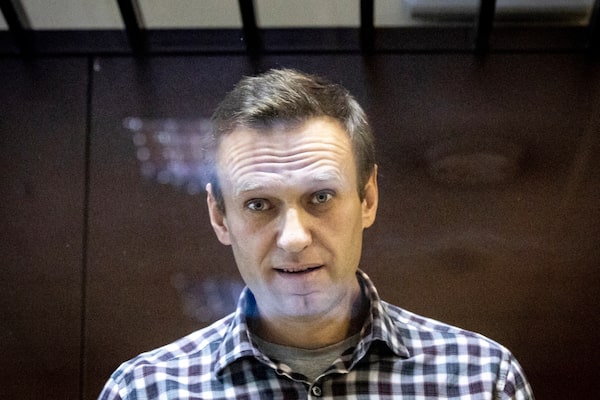
Russian opposition leader Alexey Navalny stands behind a glass cage in the Babuskinsky District Court, in Moscow, on Feb. 20, 2021.Alexander Zemlianichenko/The Associated Press
Russia’s most prominent opposition leader, Alexey Navalny, lost his appeal on Tuesday against a 19-year prison term that was added to his existing sentence last month, a Moscow court judge said.
The latest sentence was imposed on Aug. 4 after Mr. Navalny was convicted on six charges related to alleged extremist activity, all of which he denied.
His appeal was rejected by a Moscow judge after a hearing in which Mr. Navalny took part by video link. The proceedings were closed to the media apart from the reading of the verdict, despite protests from Mr. Navalny and his lawyers.
Mr. Navalny, wearing a black prison uniform, stood listening to the judge’s decision.
The latest sentence was on top of 11-and-a-half years he was already serving at the IK-6 penal colony at Melekhovo, about 235 kilometres east of Moscow, on fraud and other charges, which he also rejected as politically motivated and designed to silence his criticism of President Vladimir Putin.
Daniel Kholodny, a TV technician who worked for Mr. Navalny, was sentenced to eight years in jail in August as part of the same trial. His appeal, too, was rejected on Tuesday.
“Alexey, see you!” Mr. Kholodny shouted before the video feed ended. Mr. Navalny waved his hand in response.
Mr. Navalny, 47, is by far the best known figure in Russia’s splintered opposition, with supporters casting him as a Nelson Mandela-style figure who will one day be freed from jail to lead the country.
His political movement has been outlawed and its key figures have been jailed or fled abroad as part of a Kremlin crackdown on dissent that has intensified since Mr. Putin sent his troops into Ukraine last year.
The Kremlin has tried to portray Mr. Navalny as politically irrelevant, and Mr. Putin makes a point of never speaking his name. Russian officials portray him as an extremist and, without providing evidence, as a puppet of the U.S. Central Intelligence Agency.
Mr. Navalny earned admiration around the world for voluntarily returning to Russia in 2021 from Germany, where he underwent treatment for what Western laboratory tests showed was an attempt to poison him with a nerve agent in Siberia.
He was immediately arrested on arrival. The Kremlin denied it had tried to have him killed, with Mr. Putin commenting: “If someone had wanted to poison him, they would have finished him off.”